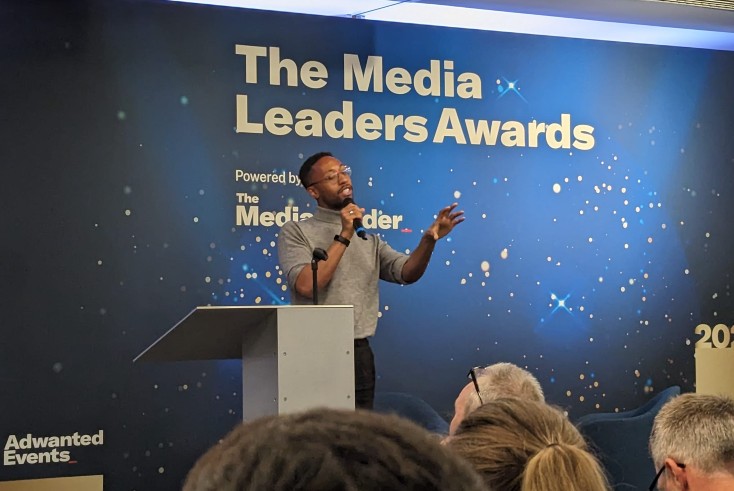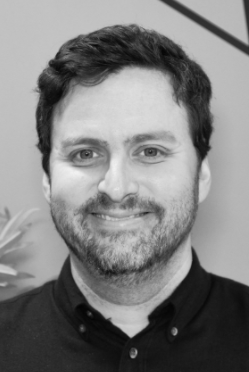Mental health, tackling ageism and inclusion: Future 100 Club pitch manifestos to leaders

The Media Leader will push for media and advertising companies to prioritise mental-health awareness and first-aiders in the workplace, following a lively pitch competition by Future 100 rising stars.
Chris Dunne, head of marketing for commercial TV marketing body Thinkbox, won the inaugural pitch yesterday, held during The Media Leaders Awards in London.
Four members of the Future 100 Club Class of 2022 implored industry leaders to push for stronger inclusivity and wellbeing policies. The manifestos were varied in their scope, but united in urging executives to take more direct actions on policies that would improve the work lives of their employees.
Announced last November, the inaugural Future 100 Club is a group of rising stars within the media industry, created with no barriers or discrimination based on age, time spent in the industry, or current job title.
The manifestos were presented by Archmon founder Simon Akers, Dentsu X managing partner Lee Mabey, the7stars data & analytics strategy director Tashan Nicholas, and Thinkbox head of marketing Chris Dunne.
At their conclusion, the audience of industry leaders was asked to vote on which manifesto they found most compelling. While it was agreed that each was exemplary, Chris Dunne’s speech on why and how mental wellness needs to be prioritised in the workplace, primarily through the training of mental health first aiders, won a plurality of votes (37%). As such, Adwanted Events and The Media Leader have committed to discuss Dunne’s proposal at The Future of Media event, held 11 and 12 October.
All the manifestos are summarised below.
Simon Akers, founder, Archmon: embrace neurodiversity in the media
 Akers revealed that at age 39, he was diagnosed with ADHD. “It made me realise I’m okay now, and it explains a lot.”
Akers revealed that at age 39, he was diagnosed with ADHD. “It made me realise I’m okay now, and it explains a lot.”
With around 15% of the population estimated to be neurodiverse, Akers hopes to help those that are in his position thrive within the industry.
He laid out four pillars for new policy to better improve support for the neurodiverse: systems, safety, spaces, and support.
On systems, Akers says it is important for the broader workplace to have understandings of neurodiversity in place as a “sense check”. For example, an employee with autism may respond differently to different social cues, so their sometimes having their camera off in a Zoom call, for instance, shouldn’t be treated as a negative, but supported instead.
Regarding safety, Akers said “the most important thing is creating a safe environment where they feel like they can say something, because some people hide this because they think it’s going to do their career damage.”
Akers also says physical spaces can and should be created for staff, such as quiet areas that can be a help to neurodiverse individuals and other staffers alike. Additional supports should also be considered, such as forums, representation groups, and help lines.
Akers is currently in the early stages of creating an advisory board to help shape an initiative to improve neurodiversity in media.
“Let’s do our bit to really empower these people in our businesses,” he concluded.
Lee Mabey, managing partner, Dentsu X: support people aged 40+ in the industry
 “I may be a future leader today, but tomorrow this industry is going to see my age as a disadvantage,” said Mabey. “We talk a bloody good game when it comes to DE&I, but we stay silent when it comes to age.”
“I may be a future leader today, but tomorrow this industry is going to see my age as a disadvantage,” said Mabey. “We talk a bloody good game when it comes to DE&I, but we stay silent when it comes to age.”
His manifesto includes three steps. Step one, he said, is to stop the brain drain. The average age of those working in the media industry is 31, but just one in five people in advertising and media agencies are aged over 40.
“If we don’t identify and address the issues of why people are seeping away from the industry, we are losing those that could empower and enrich the careers of future leaders,” he said.
Step two of Mabey’s manifesto is to “embrace lived experiences” by tapping into the wealth of knowledge provided by older workers, especially in their ability to target older consumers, which hold the majority of the wealth and purchasing power in the UK.
Step three is to make entry schemes available to all. “Why are we limiting entry level schemes to those who are young?” asked Mabey. “What a statement of intent it could make to society if we as a media industry came together and actively welcomed applications for those who are starting careers later or decided to pivot into other industries.”
Tashan Nicholas, data & analytics strategy director, the7stars: empower diverse leadership
 “I’m on a mission to make all leaders feel empowered.”
“I’m on a mission to make all leaders feel empowered.”
Nicholas, who is part of the Black and LGBTQIA+ communities, told the crowd that his whole life, he’s always been cognisant of the fact that he’s quite different from a lot of people, but that he has always wanted to make an impact as his authentic self.
He implored the audience of leaders to invest more in diverse talent. Citing the previous All In Census, he noted that 15-32% of professionals planned to leave the industry because of a feeling of lack of belonging.
His proposal would help standardise and add to current diversity and inclusion practices across the industry. Nicholas set out “5 Cs” to accomplish his goal:
Commitment, based on outcome-based goals supported by senior leadership.
Community, in the form of intersectional employee resource groups.
Coaching, by empowering individuals through personal, tailored investment in them.
Communication, such as creating a shared language for success on diversity efforts across the industry.
Creation, of a new platform to “enrol the diverse leaders today to become the future leaders of tomorrow.”
Chris Dunne, head of marketing, Thinkbox: improve mental health in the workplace
 “Actively demonstrate to the people in your organisation that you care about their wellbeing, not only as an organisation, but as a human being.”
“Actively demonstrate to the people in your organisation that you care about their wellbeing, not only as an organisation, but as a human being.”
Citing the worsening mental health crisis across the media industry, especially among junior team members who feel the “sharpest ends” of macro pressures, Dunne asked the audience to help everyone “become more fluent in the language of mental health.”
“Can we all honestly say that everybody in our organisations feels as comfortable talking about their mental health in the same way they do their physical health?” he asked.
Dunne also implied better mental health is a business imperative. He noted the total annual cost of poor mental health to employers was £56bn in 2021.
His proposal centred on one simple ask: a commitment to train 10% of the industry’s workforce as a mental health first aider in the next 12 months, and to double that figure to 20% for leadership teams.
Dunne himself became a mental health first aider in 2021, and he added that “there is enormous power in you and your leaders taking the time to get trained.”
Mental health awareness week begins 15 May.




